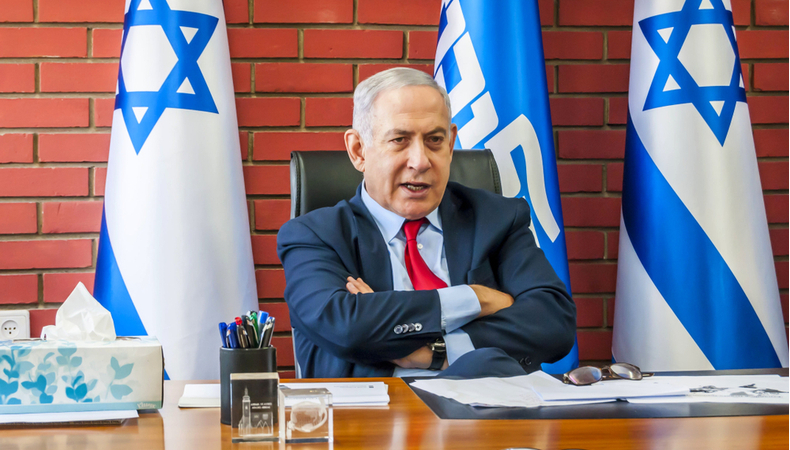Israel at the polls tomorrow,will Netanyahu be confirmed?

It was born as the government of national pacification, only on May 17, but it was short-lived: tomorrow the Israelis are called to the polls again, for the fourth time in two years. The latest polls still show a country split, as it was for the previous three rounds, in which no coalition collects a majority of 61 seats among the allies.
Everything suggests that another gruelling phase of negotiations between the parties, of entrusted and remitted positions, which could last months, will open, while fifth elections remain a real scenario. Compared to the results of March 2, 2020, the last time the Israelis went to vote, the big loser is Benny Gantz: the former Chief of Staff who took the field only in 2019, current Minister of Security, from 33 seats it dropped to 4. They do not forgive him for breaking his promise not to sit with Benjamin Netanyahu, the Covid emergency was not a mitigating factor.
A little over a year after the last elections, Israel returns to the polls again on Tuesday, March 23. The Jewish state has never seen anything like this since its foundation in 1948. One Endless political impasse that sees no exit: no party or coalition has so far come out of the polls strong enough to be able to prevail. And the polls again indicate that it will not be easy to form a government, despite the fierce campaign of Prime Minister Benjamin Netanyahu who hopes for reconfirmation.
The leader of the Russian-speaking ultra-nationalist party Avigdor Lieberman, at the time Minister of Defense, opened the political crisis in November 2018. His sudden departure from the government forces Prime Minister Netanyahu to call early elections. The novelty is called Benny Gantz, former Chief of Staff, who announces the descent into the field with his new Blue and White party, which brings together the centrists of Yesh Atid and two other generals, Moshe Yaalon and Gabi Ashkenazi.
The declared goal is to send home the Likud leader, who has been in power for ten uninterrupted years. But the response of the polls is not clear, everyone celebrates victory, no one has enough numbers: the two main challengers are each with 35 seats in the Knesset out of 120. Netanyahu is instructed by President Reuven Rivlin to try to form a government coalition but not he can do it. After weeks of tight negotiations, the Likud leader is forced to throw in the towel, and new early elections are called for September 17.
The scenario is almost identical, Netanyahu against Gantz. The former chief of staff attacks with his head down and promises that he will never enter an executive with the Likud leader. It ends again in substantial parity, 33 to 32 for Blue and White. Netanyahu is again chosen to try to form a government and launches the proposal of the executive of national unity but Gantz refuses. Faced with the Likud leader’s failure, on 21 October Rivlin gives the job to Gantz, but he too – after a month of talks – is forced to acknowledge the failure.
On November 21, Attorney General Avichai Mandelblit indicted Netanyahu for corruption, fraud, and breach of trust in three cases, the first time of a prime minister in the dock. His accusations were rejected by the Likud leader who denounced a “coup” against him. Meanwhile, no one can find an exit to the political crisis and we go back to the polls again, for the third time.
There is no two without three, and the country hopes that these elections will bring Israel out of the political impasse in which it has been struggling for over a year. Not to mention that the first echoes of the Covid epidemic are already arriving, which also affects Israel in a short time. Likud has 36 seats against Gantz’s 33 but, with the support of 61 deputies, gets the position. But again it fails to put together a coalition. Meanwhile, Israel is forced to enact a tough lockdown to try to stem the coronavirus.
On April 20, the twist, the two bitter rivals announce that they have found an agreement for an emergency unitary government whose first objective is to ‘save’ the country from the epidemic. The executive will run for three years with a rolling premiership of 18 months each, starting with Netanyahu. An unprecedented agreement that in May gets the go-ahead from the Supreme Court and then the trust of the Knesset. But Gantz’s move, which he claimed as necessary in the face of the unprecedented health crisis that has hit the country, splits the coalition.
Blue and White go to government with Netanyahu, with Amir Peretz’s Labor too, while Yair Lapid’s Yesh Atid together with Moshe Yaalon goes to the opposition, shouting treason. A difficult cohabitation in power begins between Likud and Blue and White that collapses in December due to the failure to approve the budget law.
The Knesset is dissolved and new elections are called for March 23. This time, the scenario is different: the opposition against Netanyahu is no longer Gantz, who collapsed in the polls due to his betrayal with Bibi. But the situation hasn’t changed much, because according to the polls, no bloc has a majority to form a government. The Likud leader, fighting for political survival that can save him from legal woes, has to contend with three main opponents: centrist Yair Lapid, former Likud ally Gideon Saar, and ultra-nationalist right-wing of Naftali Bennett.




